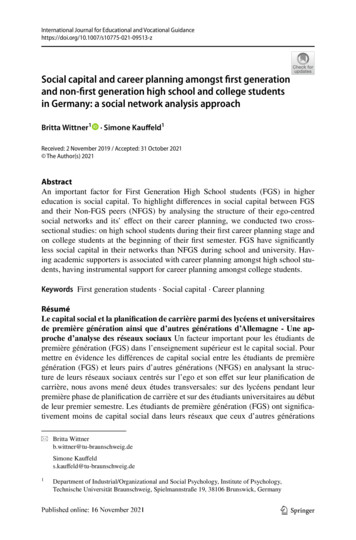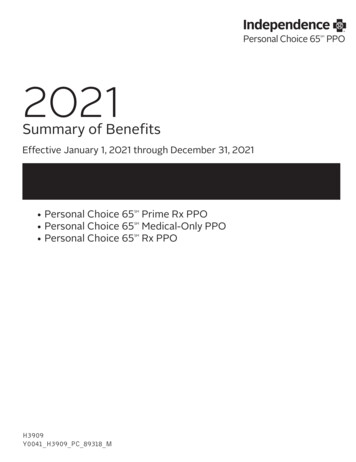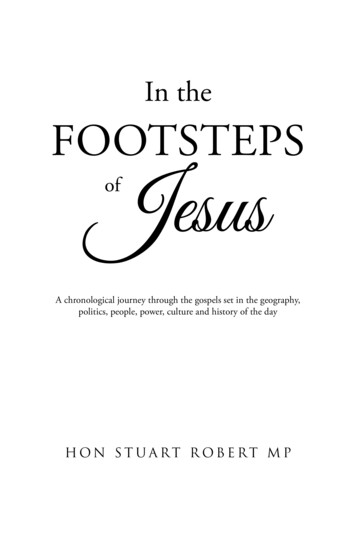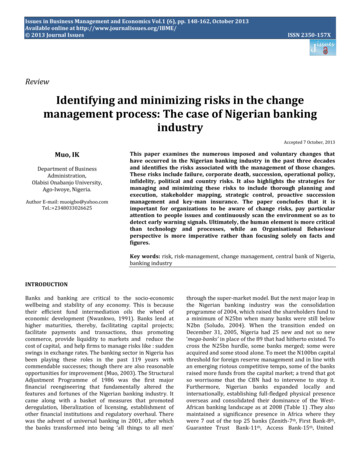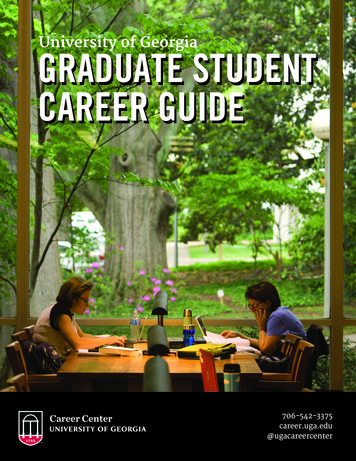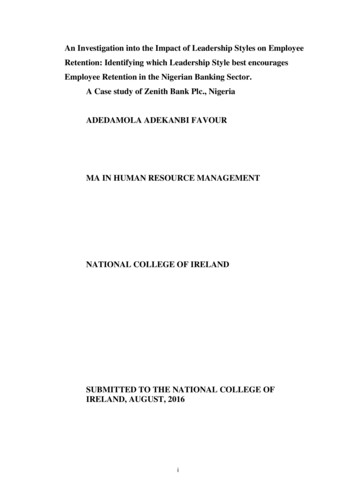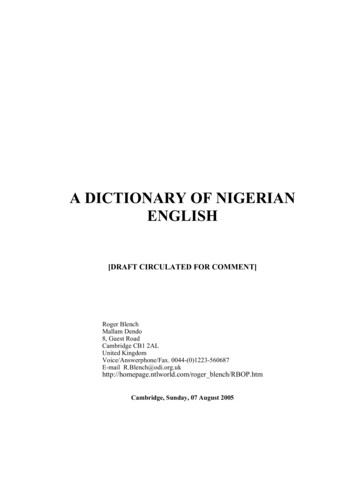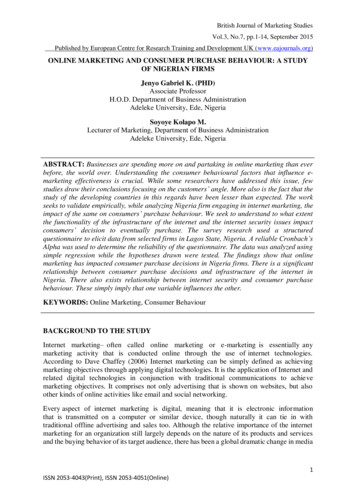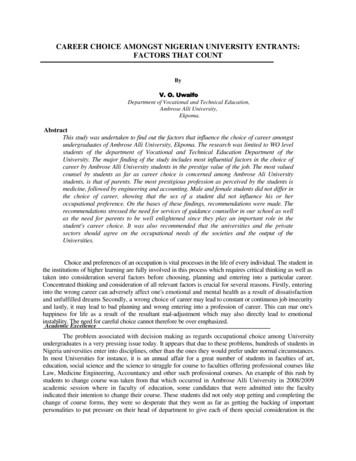
Transcription
CAREER CHOICE AMONGST NIGERIAN UNIVERSITY ENTRANTS:FACTORS THAT COUNTByV. O. UwaifoDepartment of Vocational and Technical Education,Ambrose Alli University,Ekpoma.AbstractThis study was undertaken to find out the factors that influence the choice of career amongstundergraduates of Ambrose Alli University, Ekpoma. The research was limited to WO levelstudents of the department of Vocational and Technical Education Department of theUniversity. The major finding of the study includes most influential factors in the choice ofcareer by Ambrose Alli University students in the prestige value of the job. The most valuedcounsel by students as far as career choice is concerned among Ambrose Ali Universitystudents, is that of parents. The most prestigious profession as perceived by the students ismedicine, followed by engineering and accounting. Male and female students did not differ inthe choice of career, showing that the sex of a student did not influence his or heroccupational preference. On the bases of these findings, recommendations were made. Therecommendations stressed the need for services of guidance counsellor in our school as wellas the need for parents to be well enlightened since they play an important role in thestudent's career choice. It was also recommended that the universities and the privatesectors should agree on the occupational needs of the societies and the output of theUniversities.Choice and preferences of an occupation is vital processes in the life of every individual. The student inthe institutions of higher learning are fully involved in this process which requires critical thinking as well astaken into consideration several factors before choosing, planning and entering into a particular career.Concentrated thinking and consideration of all relevant factors is crucial for several reasons. Firstly, enteringinto the wrong career can adversely affect one's emotional and mental health as a result of dissatisfactionand unfulfilled dreams Secondly, a wrong choice of career may lead to constant or continuous job insecurityand lastly, it may lead to bad planning and wrong entering into a profession of career. This can mar one'shappiness for life as a result of the resultant mal-adjustment which may also directly lead to emotionalinstability. The need for careful choice cannot therefore be over emphasized.Academic ExcellenceThe problem associated with decision making as regards occupational choice among Universityundergraduates is a very pressing issue today. It appears that due to these problems, hundreds of students inNigeria universities enter into disciplines, other than the ones they would prefer under normal circumstances.In most Universities for instance, it is an annual affair for a great number of students in faculties of art,education, social science and the science to struggle for course to faculties offering professional courses likeLaw, Medicine Engineering, Accountancy and other such professional courses. An example of this rush bystudents to change course was taken from that which occurred in Ambrose Alli University in 2008/2009academic session where in faculty of education, some candidates that were admitted into the facultyindicated their intention to change their course. These students did not only stop getting and completing thechange of course forms, they were so desperate that they went as far as getting the backing of importantpersonalities to put pressure on their head of department to give each of them special consideration in the
approval for the change. This situation is common to other faculties where according to the students theyaccepted the admission into their present courses as a last resort as many of them did not in the first place applyto this area for admission This practice is not only common in Ambrose Alli University but to many otherpublic Universities in Nigeria where the possibility of gaining admission into the Universities is becomingvery cumbersome by the day and rejecting such admission into these courses one is admitted into may beimpossible because the possibility of securing admission into the course of one's choice in the presidingsession is a 50-50 chance.Statement of ProblemThe decision on what career to choose is very important one in the life of an individual, this isbecause, if not adequately done, wrong career choice would lead to frustration, emotional and vocational maladjustment which could mar one's happiness for life. As have been earlier observed, it appears that moststudents in Nigeria universities enter into discipline other than the one they will actually prefer under normalcircumstances. This had lead to students making frantic efforts at the end of every session, to change thecourse while those who succeed in changing their courses feel satisfied others who are not are bound to sufferpsychological depression that will affect them for a very long time owing to their inability to fulfil their careerof dream. There is no doubt that this is a problem not only to the students and their parents, but also theuniversity authorities. This is why the university authorities have shown concern over this trend. This is theproblem that this study intends to conduct a research into. It is an attempt to determine the factors whichinfluence career choice by university undergraduates in Nigeria universities with particular reference toAmbrose Alli University Ekpoma.Research QuestionThe following questions were raised to guide this study:1. What factors influence student's choice of career?2. Out of these identified factors, which is the most important?CareerAmongstNigerianUniversity.3. ChoiceOn whosecounseldo mostof the students choose their career?4. Which is the most preferred career among Ambrose Alli University students?5. Significance.The findings of the study will: Help to gain insight into the career preference of Ambrose Alli University students. Serve as an opportunity to furnish those who are concerned with the education of students, afirst hand information on the factors influencing students career choice and help them to findways of meeting the personal need of students. Help the guidance counsellors to know more about students problem and how to help themby giving them prefer career counselling which could save them from further frustrations ifthey choose wrong profession. Be of great use to the nation as she stands to gain in terms of proper use of manpower andproductively when people are fixed in their chosen careers. Throw more light on the amount of knowledge the students have about job availability in thecountry and also help curriculum planners to provide meaningful educational programme sothat students entering into institutions of higher learning will have a clear perception of whatto do.School Subjects and Students Choice of CareerAn individual's choice of subject may influence his decision as to the choice of career he wants to gointo. The decision on which subject to choose therefore, is a very important one because of the effect it has onthe future life of the student. Okeke (2007), in his article, stated that what student learn at school, shape theirfuture choice of career and condition their interest as regards their area of specialisation. He found out schoolsubjects have most influence on student's occupational choice In a study conducted in a secondary school in
Edo State, he found that although, only 3% of them indicated their willingness or desire to become farmers andtraders but none of them actually expected to take up such job. According to him, it was the school subject thatseem to direct their attention away from their parent's traditional occupation because prior to the introductionof formal education. The adolescent towed the occupation line of their parents but formal education andsubject studied became status symbols which train them away from parental occupation which now appears tobe done by those usually regarded as by illiterates in the society. This investigation was carried out in a schoolformally established as a commercial school but later changed to a secondary school with productivity toAcademicExcellencecommerciallybased subject. In an attempt to determine the possible influence of school subject on thechosen occupations of the graduates of the school, a follow up studies was carried out by Nwoke (2008),results indicate that all students who successfully combine general subject with commercial subjects, achievedemployment quickly as accounts clerks, office clerks, teachers, and managers of business enterprises. Hecontinued that since it has been irrefutably proved that school subjects stimulate the choice of career andcourses offer at higher educational levels, which have vocational implications, it is expedient for educator tostructure the curriculum in such a way that it will provide proper interest to the student. Peer groupinfluence on choice of career is another factor that exerts a lot of influence on the students choice of anygiven course of study. In classroom, the student peer group present some of the most salient meaning reward,they exert strong influence on one another value and attitude about school developing aspiration and schoolbehaviour.Many scholars have contributed to the view that the home or family environment has significantinfluence on student's choice of a vocation. Olatunji (2003) opined that there is positive relationship betweenthe educational aspiration of the students and the social status of the family. The advice and encouragementgiven by parents irrespective of the social status of the family has a significant influence on raising educationalaspiration. It is advised therefore, that schools should recognize and understand the family as a teachinginstitution.Roe (2004) carried out a study on factors that influence a person choice of career and came up with atheory which was based on the notion of individual's personality development and the desire to satisfyone's needs. According to him, a person parental orientation and his social milieu exert greater influence inthe development of basic attitudes, interest and capacities, which will be given expression in the generalpattern of adult life in his personal relations, in his emotional reactions and his vocational choice. It was Roe'scontention that the type of home an individual comes from influence his vocational aspirations. In herview, scientists come from cold homes and there is always a tendency for individual's from such homes todevelop aggression attitude and that such attitude would usually find society accepted in occupational terms.On the other hand, those brought up from accepting homes, tend to be in services to occupation which areprimary oriented towards giving services to people.McLaughlin Lunt and Muntgome (1976) discovered that the socio-economic status of the familyinfluence the occupational choice of the children. Even some students often involuntarily choose careersreflecting the socio-states of the family they came from. The educational attainment of parents also plays asignificant role in the student choice of career. Students from literate homes tend to aspire to highereducation unlike those from illiterates homes. This is due to lack of motivation from uneducated homes.According to Morish (1972) the parents' interest and their occupational aspirations for children cannot bedivorced from their own personal educational and cultural level and the home environment they provide fortheir children. Explaining the importance of the close association between father's level of occupation and thefeeling of belief towards the education of children, Robbins(2005), stated that the proportion of lego forfull timehigher educationis 45% from those whose fathers have skilled manual occupation.This study indicates that students' academic performance was highly correlated with the feelingsabout themselves, especially their self-appraisals as effective peers and as an effective student. In otherwords, the pattern of peer group friendship within the class and outside has a great impact upon student selfconcept and attitude towards school. Therefore, student choice of career or course can be highly affected by
the peer group, which they belong. If their peer groups detest some specific courses, you will feel inferior togo into other lines so that you can continue to belong to your group and hold to your self esteem.PopulationThe population of this study is made up of all 450 students in 100 level of the Department ofVocational and Technical Education, Ambrose Alli University for the year 2008/2009 sessions.Sampling and Sampling TechniqueAll the 450 students in 100 level students in the department were randomly selected using therandom sampling technique. The sample used for this study is made up of 100 students consisting of sixtymale and forty female students respectively.The Research InstrumentThe questionnaire was the instrument used for gathering information for the research. This wasdesigned to sample response of students regarding the question raised in the statement of problem. Theywere constructed to collect relevant information needed for answering the question in the statement ofproblem of the study.Data AnalysisThe data gathered from the questionnaire were analyzed using the frequency counts, mean scores,standard deviation and percentage.ResultsTable 1: What is the Parents Level of Education?The Father's Level of Education:No. of Respondent141110783416100Non formal educationPrimary education onlySecondary education onlyNCE/ONDHMDUniversity 6936.5415.38100 %Academic ExcellenceThe Mother Level of Education:Non formal educationPrimary education onlySecondary education onlyTeachers grade 11NCE/ONDHNDUniversity degreeOthersTotalNo. of .353.8511.543.8521.1516.35100 %From the above data, it was observed that majority of the parents have a high level of education.Quite a number of parents also have little or no education at all. For instance out of the 100 respondents, 25
mothers and 14 fathers have non-formal education, making a total of 42 parents who have non-formaleducation, 21 of them have primary education and 27 have secondary education.Table 2: The Most Influential Factor in the Choice of Career by Ambrose Alli University Student.FactorsFrequencyPercentage (%)Parental pressure54.81Subject done at school1716.35Parental education65.77Prestige value of the job2019.23Socio-economic status of parent1211.54Sex32.28Case of admission into university 43.85u - aL A1413.46Others1514.42From the data given in Table 2, it can be seen that as far as Ambrose Alli students areconcerned, it is the prestige value of the job that influence most of their choice of a career. This factor hasthe frequency of 17, which is 16.35% of the overall total high salary comes third with a frequency count of14 and 13.46%. On the other hand, the table has shown that the sex of a student is not an influential factorin students' choice of career, it has a low frequency count of 3, which is 2.28%. Contrary to expectation, twofactors, the case of admission and the influences of friends are not highly regarded by students of AmbroseAlli University as influential factors in career choice. Both have frequency count of 4 and 3.85%,Career Choice Amongst Nigerian University.Table 3: The Most Valued Counsel by Ambrose Alli University in their Choice of a Career.No. of RespondentPercentage llor Personal18 819.23conviction97.658.65Total100100 %Data on table 3, shows that students value their parents advice most when it comes to the question ofchoosing a career. This factor has a frequency count of 40 and 41.38 percent of the overall total. Theimportance of the teacher's advice and those of friends come second and third respectively with frequencycount 25 and 18 and percentage scores of 24.04 and 19.23. Guidance counselling comes last on this table with afrequency count of 8, which gives 7.69 percent.Table 4: Mean Scores Standard Deviations and Rank; Order of Occupational Preferences byAmbrose Alli University StudentsOccupationXRank Order RemarkAccountancy6.083Medicine3.971Most 25Administration office11.410University lecturing11.289
Armed ClergyContracting 12.3313.6514.6212.4414116781716121913182015Least prestigiousThe data on table 4, shows that medicine has been chosen as the most prestigious profession byAmbrose Alli University students. It has the mean score of 3.97. Medicine is closely followed by engineeringAcademicExcellencewiththe meanscore of 5.74 and accounting with a mean score of 6.57 others in the ranking order are Law6.58, Architecture 8.32, Pharmacy 8.60 and Banking and Finance 8.94. On the other hand, the clergy with amean score of 14.62 is regarded as the least prestigious profession. This is followed closely by teaching witha mean score of 14.08 and farming with a mean score of 13.65.Discussion and FindingsFrom the available data given it is discovered that a majority of the parents of the respondentsparticularly the mothers have low or no educational qualification at all. This is bound to affect the students asfar as the choice of adequate career is concerned, since parents play a prominent role in this area, it istherefore necessary that parents should avail themselves of the adult education classes to enable them updateand enlighten themselves in order to be in a better position to advise their children adequately on careers tochoose from.Findings in table 2, shows that the most influential factors in career choice as far as Ambrose AlliUniversity students are concerned is the prestige value of the job followed by the subjects done at schools andhigh salary. This explains the reason why students struggle very hard to change courses and go into areaswhich have high prestige values and better job prospect. Gone are the days when students just go into theuniversity to study any course at all. There has been an increasing crave for professionalism since the 1980s.The findings in table 3 also reveal that the students value the advice of their parents very much. Theadvice of their teachers and those of their friends comes second and third respectively. It must be noted thateven though they value that advice of these people very much when they actually want to choose a career, it isthe prestige value of the job and the subject done at school that count and influence them most as indicated intable 2. Parent must therefore struggle hard to improve themselves so that they will be in a better position tochoice and advise their children since these children value their advice more than any other. The teacher toomust help the students to pick the right subjects at school so that they do not have problem when they wantto choose a career. Findings also show that students value the advice of their friends too but these friendsdo not influence them greatly when they want to choose careers. This is probably because friends or peergroup of the respondents are not knowledgeable enough on the career available and what those careerentail to be able to pressurize their friends to go into such careers. It also show that the career counsellors arenot adequately used for students in schools. If the services of these specialists were made use of, most of theproblems the students encounter at the university level which push them to struggle for change of course wouldhave been averted.Findings on table 4, shows that the most prestigious profession as perceived by Ambrose Alli Universitystudents is medicine. This is closely followed by engineering and accountancy in that order. It shows thatstudents still regard these traditionally accepted professions as most prestigious. Today there are varieties of
to Nigerianthe students,which equally are prestigious as the ones they have chosen. This can beattributed to the non-availability of career counsellors in most institutions. The findings further reveals that thesex of the students actually play very little role in the students' perception of the most prestigious profession.It goes to show that both "male" and "female" students do not look on any profession as being the preserved ofonly male or females. The sex of a person no longer matters as far as career choice is concerned. The clergyand teaching followed by farming were chosen by the students as the least prestigious profession. The choiceof teaching as one of the least prestigious professions is not surprising, because it is a common fact that teachingis looked down upon in the society probably because of the low remuneration that the job attracts. Farming alsois an area that most of the Nigeria youth do not want to go into because it is not a white-collar job. Thechoice of clergy as the least prestigious professions by all the students however, is highly surprising, one wouldhave thought that profession would be highly regarded and rated because of its divine nature but the fact it is aservice profession with low remuneration and a reserved life style may have discouraged many students fromgoing into it.RecommendationsA number of intriguing issues that need the immediate attention of the federal and state governments aswell as the universities and private sections of the economy have been raised in this study, it is thereforerecommended that:1. Vocational guidance service should be incorporated into the Nigeria educational programmes at everylevel of education from primary to the tertiary institutions so as to help students choose appropriatecourse for the career they want to study.2. Since school subject play an important role in determining students' choice of career, studentsshould be guided by school authorities to carefully choose their subjects with the view to pursue theright career.3. In view of the evidence of this study that parents counsel are valued most by students, parentsshould be encouraged to be enlighten in order to be able to give sound counselling to their children.Adult education is a very important programme which parents that have non-formal education canattend to put them in a position to counsel their children. This study has shown that most parents of thesubjects of this study have no-formal education.4The Ministry of Education should develop vocational education programmes for students at thesenior secondary school level to enable them have wider knowledge of career and vocationavailable to choose from particularly during this age of science and technology where many newfields or career openings have come into beings.5. Teachers should be given training in guidance and counselling seminars and lectures so as to enablethem guide the students in their occupational choices. Also, teacher conditions of service shouldbe improved upon to enhance their knowledge dissemination.Academic Excellence6. There should be greater dialogue between the university and the private sector. Theuniversity should know what the labour market needs so that they can streamline their course of studyof such needs and advice the students accordingly.ReferencesAllele-Williams, E. G. (1986). Education and the status of Nigeria women. Proceedings of seminar ofNigerian women and development. University of Ibadan.
FGN (2000). Education Today, A Quarterly Journal of the Federal Republic of Nigeria. Ministryof Education, Abuja. 8(2), Sept.Federal Republic of Nigeria (1981). Implementation blue print of UBE scheme. Lagos: FederalGovernment Press.Federal Republic of Nigeria (1988). National Policy on Education. Yaba. Lagos: NERDC Press.James, A.O. (2008). A catalyst for women empowerment in Nigeria. Department of developmentmanagement, Institute of Public Management and Development Studies, Ethiopian Civil ServiceCollege, Addis-Ababa, Ethiopia.Lipsett, L. (1987). Social factors in vocational development. In: Hospon and J. Hayes (ed). Op. cit., pp.107-114.McLaughlin, Hunt & Montgomn (1976). Socio-economic status and the career aspiration and preoccupationof women in higher schools. Vocation Guidance Quarterly, 25 (2),155-162.Moorish, Ivor (1972). The sociology of education; An introduction, Union Education Books, London:George Allen Unwin.Okeke, A. N. (2007). Choice of occupation. West African Journal of Education, 8(4), 34-39.Roe, A (2004). Early determinants of vocational choice. Journal of Counselling Psychology. 5(2), 55 - 62.
influence career choice by university undergraduates in Nigeria universities with particular reference to Ambrose Alli University Ekpoma. Research Question The following questions were raised to guide this study: 1. What factors influence student's choice of career? 2. Out of these identified factors, which is the most important? 3.

